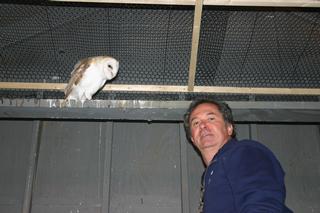We are developing the social individualist meta-context for the future. From the very serious to the extremely frivolous... lets see what is on the mind of the Samizdata people.
Samizdata, derived from Samizdat /n. - a system of clandestine publication of banned literature in the USSR [Russ.,= self-publishing house]
|
Io9 lists their ten best sci-fi libertarian stories: and the mix is an interesting combination of the obvious and the outliers. The anarcho-socialist tradition, mostly British, is referenced, revealing some surprises on the influences that could be fictionalised as libertarian utopias. My own favourites are that hoary old goat, the fabian Wells, providing a counterpoint to his scientific socialism, and Eric Frank Russell with his homage to Gandhi.
Some would criticise the absence of L. Neil Smith, Ken McLeod and others, but lists are always a springboard for discussion, an opportunity to find works that did not blip the reading radar.
Outside the Westminster Bubble of bent MPs and Brownite thugs, other political developments take place. And few of them are likely to be more important for the state of the world than the Indian polls, now concluded. This report says the Congress party, the party of Nehru and Gandhi, has won. Congress, if my memory is accurate, was associated for a long time with a centre-leftist sort of nationalism. However, it may have moved on a bit from that – India certainly has. Despite the 2008 stock market crash, the ascent of the Indian economy, due in large part to some of the deregulation that has taken place, has been one of the bright spots of the world economy over the past decade or more. It is arguably more sustainable over the long term than in the case of China. Britain, with its post-Empire connections to India, should certainly pay close attention. And given India’s proximity to Pakistan, a nuclear power now in a deadly confrontation with the Taliban, it cannot be emphasised often enough how this “Anglosphere” power matters. India should, for example, be taking a lead role in helping to suppress piracy in the Indian Ocean, a subject about which I have written from time to time.
So these elections matter. It is not all about the Chicago Community Organiser or the One-Eyed Nutter With the Stutter, otherwise known as the UK prime minister. Let’s remember that.
Update: Guido seems very enthused by the result. The Indian stock market has rallied strongly today.
One of the lovely things about the interweb is the complete freedom to post obscure, intractable, thoroughly off-putting essays, revelling in the fact that even if 99.9999 per cent of humanity really doesn’t want to read e.g. a rambling 12,000 word reflection on some little-known artist by a totally unknown commentator – a perfectly legitimate point of view, obviously – well, there’s still the outside chance that someone out there, somewhere, actually will want to read it. And sometimes just the prospect of connecting, probably anonymously and certainly at a great distance, with that one other person is what makes the whole project worthwhile.
– Bunny Smedley comments on a short posting at my place
I have been somewhat quiet of late as I am on the road again, going from job to job to keep cash flowing sufficiently to keep me alive until my aerospace startup can keep me busy and paid full time. In the last 30 days I have worked jobs in Manhattan and north of DC; at the moment I have one day of business in Pittsburgh and am staying with the other half of “Browning and Amon” (or vice-versa), a duet from my younger days as a fixture in the Pittsburgh music scene.
Mark Browning, besides being a fellow singer-songwriter and guitarist who shared many years and several bands with me, is also a Pittsburgh zoo-keeper and has used his knowledge of birds and his fertile imagination to invent a product for a market most of us would never have imagined existed: housing for Barn Owls.

An Owl ponders the possibilities of Mark and dinner.
Photo: Courtesy of Mark Browning
Sound strange? You might think so and you would be wrong. Barn Owls, beside being large, gorgeous and fascinating predators also happen to be exceedingly effective controllers of small mammals. Since I long ago shared a flat with Mark and assorted birds and vipers, I realized immediately how useful it might be having some living about your farm field. What I did not realize was just how big the potential market is. To be truthful I still do not know how gargantuan it may be, but it is simply huge. There is hardly a farm in the Anglosphere world (and perhaps later elsewhere) that would not profit from the free service provided by these birds.
His boxes are selling like hotcakes in the California wine country. Sales are accelerating rapidly. Barn Owls love his nesting boxes and growers are packing them into their fields as closely as the Barn Owls will go along with. I would say there is every chance Mark will make his million from warm blooded flying predators long before I make mine off rapidly flying objects of the manmade kind.

Mark with his box and the Pittsburgh skyline behind him.
Photo: Courtesy of Mark Browning
You may wonder what is so special about these things. I cannot give out details I have been told over a few beers (well, not just a few. A lot actually) until his patent is through, but it comes down to a design which lasts and is naturally cooling. It gives barn owls a cool nesting place even if there is direct sunlight. If one happens to be flying around in the neighborhood it will make a beeline for one of these boxes because large enough hollow trees are rare and their old wooden barn homes are rapidly disappearing.

A proud homeowner surveys his cool new pad.
Photo: Courtesy of Mark Bornwing
I would not be at all surprised to turn on Autumn Watch in a year or two and see Bill and Kate talking with Mark about the increase in owl population these boxes have brought about.
I am sure our own Editor Perry deHavilland will also appreciate this advance in Barn Owl housing…

Perry with his familiar, Cadaemus, during his Hogwarts days.
If you are interested you can find out more from The Barn Owl Box Company web site.
Thomas E Woods – whom I mentioned the other day – hits back most satisfyingly at Matthew Yglesias. The latter had some sniffy thoughts about Mr Woods’ recent book on the financial crisis. For the sin of looking at the crisis through the perspective of Austrian economics, with its specific way of looking at the economic cycle and the role of banking, Mr Woods incurs a certain amount of sneering from Mr Yglesias.
Mr Woods gets the distinct impression that Yglesias has not read his book. I have no idea whether he has or not; but there does seem to be a recent pattern of leftists trashing the likes of FA Hayek, or whomever, in a way that suggests that they haven’t the faintest idea of what or who they are talking about. You can just picture the thought process that goes through Mr Yglesias’s mind: “Ah, these central Europeans with their funny names and their think tanks – who are they to question the great Keynes and his sensible ideas on demand management”.
But I detect a sign that perhaps, just perhaps, the Yglesiases of this world are losing some of their Olympian self-confidence. At a City event the other night, listening to people talking about the economy, I did not get the impression from all the associated financial types that the idea of using the printing press to cure problems caused by underpriced credit was regarded as very brilliant. In fact quite a few folk are mentioning inflation as the issue that could hit Real Soon Now.
Thomas E. Woods is great value. Check out his website.
Time Rice has said that to write a great pop lyric you need to “fall in love with cliché”. Shahid Malik MP, who is one of the smartest and most personable of the younger New Labour generation (full disclosure: I know his brother, who is a brilliant computer scientist and an IT entrepreneur), has had a go at repudiating accusations about his parlimentary expenses. He says his allowance claims were “a million percent within the rules”.
If that is a deliberate attempt to package in a soundbite the suggestion (1) that he is intensely distressed to have been traduced, with the hidden message (2) that he is insufficiently numerate to have been conscious that the figures might look a bit odd, then it is an impressive subordination of cliché to the political purpose of asserting his honesty. It comes across as demotic and with the right tone of shock at being singled out. As long as Mr Malik is not subsequently proved to have done anything seriously wrong, he will be one of the winners out of this political crisis.
It is a weird world. A political career can be built on or destroyed by a few words. And the words need not be obviously rhetorical. It is all the smarter if they are not.
Update: [& typo corrected above.] He’s “stepped down” as a minister while suggestions that he has broken the ministerial code are investigated. That too strikes me as a smart damage-limitation move. Some commentators seem to assume I am defending him. I am not. I don’t have any opinion on the allegations. I’m admiring his chutzpah and musing on how subtle the game of media democracy is.
When I did education blogging I wrote a lot about something I called sovietisation. This referred to the baleful impact upon education of our present government’s mania for setting targets (often involving exam results) and then rewarding institutions according to how well they could fake reaching these targets. In this connection, see this posting by David Hepworth. It is based on a story that has already seen the light of day in Times Higher Education, although I couldn’t get further with the link in Hepworth’s posting than that.
This comment on Hepworth’s piece by a certain Rob Spence deserves, I think, slightly wider circulation:
I work in a university that’s in what is coyly termed the same “sector” as London Met – i.e. the widening access, non- “traditional” student sector. There’s a real tension between the government’s agenda to have 50% of people taking a degree, and the absolute imperative, driven by the funding model, to retain students. So on the one hand we are accepting students with at best a mediocre academic record, whose motivation is not study but lifestyle, and on the other we are being penalised financially if we fail to retain them. No-one can be surprised if these utterly apathetic students drift away, but the system insists that every student who decides, for probably very good reasons, that they don’t want to carry on, represents a failure on the part of the university, which then gets its funding reduced.
You are right, it looks as if they are cooking the books, but it’s actually quite difficult to keep track of non-appearing students, because whereas in the past we could just withdraw them, now we are expected to keep them on the books.
There are quite a few “ghost” students who register, but never turn up – we had one last year who registered, collected her student loan, and disappeared to Ibiza.
Quantifying success, eh? It can really get you into trouble. Especially if you are the government. You define success, but you end up trampling all over it.
You define educational success as, say, vast numbers of people going on to university who don’t really want to go on to university. But by the time the policy has worked its evil way, the thing being measured has done a cartwheel. In this case, the thing that the government pays for, people turning up at a university, is measured. But people vanishing soon afterwards is something that it is in nobody’s interests to notice. The university wants to hang on to the government’s money. The government wants to be able to boast about how swimmingly everything is going and how much it is helping. Only a few malcontents grumble, in things like blog comment threads, but if they get serious and loud about their grumbling, they too will find their interests seriously suffering, as they well know.
With enterprises that are responsible to themselves and to a gang of people in their immediate vicinity, people who are basically taking their own chances at their own expense, a mess like the one described so well by Rob Spence eventually gets corrected, because it costs too many people too much to persist with it. They change the definition of success to one that works better. Or they replace the boss, or even all the bosses. If all that fails, they shut the enterprise down and everyone goes their separate ways. Which is often acrimonious, because quite a few people may still be getting what they want for a price they can live with, but at least the badness for those who are not so happy with things stops. But when the government’s success measurements cause havoc, everyone is all too liable still to conspire to say that all is well.
What makes sovietisation so uniquely itself is the way that everyone knows the story – what is going wrong and why it is going wrong – but nobody has any interest in telling the story like it really is, up to and including the Minister for whatever it is being deranged, for he/she too depends on all those statistically encoded lies to tell the world that he/she is doing a great job instead of merely a very average or worse job. The Prime Minister likewise, come to that.
The answer is to denationalise everything. Not easy, I know. But necessary if you want this kind of nonsense to be kept within bounds.
All I can say is… hehehe.
Read the testimonials… hilarious.
At the bottom of this, you can read this:
This is a parody and in no way expresses any political ideology, nor does it intend to defame the BBC.
But don’t let that put you off. My thanks to this guy.
A US stealth aircraft, photographed while breaking the sound barrier. I don’t know why, given that Man has achieved the feat of breaking Mach 1 for more than half a century since the great Chuck Yeager officially did it first, but stuff like this still gives me a buzz.
The occupation of a member of Parliament would thereupon become an occupation in itself, carried on, like other professions, with a view chiefly to its pecuniary returns, and under the demoralizing influences of an occupation essentially precarious. It would become an object of desire to adventurers of a low class, and 658 persons in possession with ten or twenty times as many in expectancy, would be incessantly bidding to attract or retain the suffrages of electors by promising all things, honest or dishonest, possible or impossible, and rivalling each other in pandering to the meanest feelings and most ignorant prejudices or the vulgarist part of the crowd
– J.S. Mill, quoted in The Times on March 13, 1906, discussing the likely consequences of paying MPs for their service. I hope Patrick Crozier will forgive me more more or less copying his post in its entirety, but it really deserves repeating.
Norman – now Lord – Tebbit, famously the scourge of trade union militants and who also survived a murder attempt by the IRA in the mid-1980s (an ex-RAF fighter pilot by the way), is urging voters not to vote for the main political parties in the European elections. Instead, the implication is that folk should vote for UKIP. Well, that is Guido’s take on the matter.
Suddenly, the Tory Party does not look in quite such bouncy shape this morning. I guess when you have MPs trousering taxpayers’ money on a fairly impressive scale, it dents the brand somewhat. Like I said yesterday, though, the central problem of UK political life is not fiddling expenses. No, the problem is a continuing failure to push for a major rollback of the state, including removal of this nation from the clutches of an European federal state. Compared with how much money is wasted on quangos, or ID cards, or the rest of it, an MP’s claim for swimming pool maintenance is small beer.
|
Who Are We? The Samizdata people are a bunch of sinister and heavily armed globalist illuminati who seek to infect the entire world with the values of personal liberty and several property. Amongst our many crimes is a sense of humour and the intermittent use of British spelling.
We are also a varied group made up of social individualists, classical liberals, whigs, libertarians, extropians, futurists, ‘Porcupines’, Karl Popper fetishists, recovering neo-conservatives, crazed Ayn Rand worshipers, over-caffeinated Virginia Postrel devotees, witty Frédéric Bastiat wannabes, cypherpunks, minarchists, kritarchists and wild-eyed anarcho-capitalists from Britain, North America, Australia and Europe.
|







